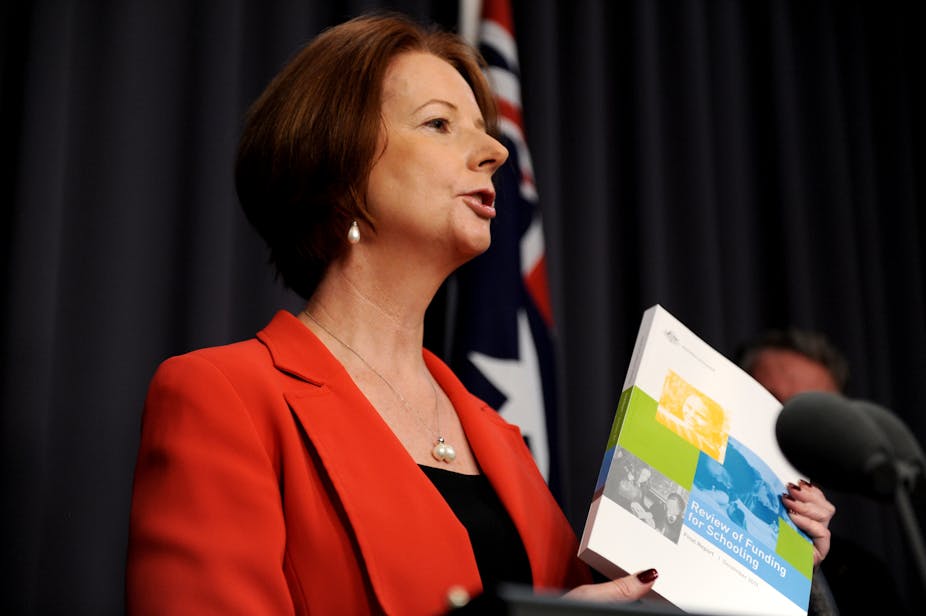After nearly six months on the policy bench, the Gillard Labor government is planning to release its response to the Gonski review into school funding.
The government is still debating the reforms in cabinet but it is looking to raise the spend on schools by around $6.5 billion – $1.5 billion more than the amount recommended by head of the review, businessman David Gonski.
Of course, when opinion pollsters ask which major political party has a better track record on education, the public invariably goes for Labor. This may reflect a popular view that, while the Liberals may be attentive to the needs or private education, Labor’s association with state-provided education implies a more universal approach to handing out the education dollars.
It might also reflect the great importance Labor attaches to education not only for its short-term utility as an issue that can make Labor popular ahead of an election (although the issue is not without its dangers) but also because education is seen by social democrats as a great tool by which change in society can be achieved.
In light of all this, the Gillard government’s rather muted initial response to the release of a report in to education and its attendant recommendations of using federal financial resources to boost education outputs was something of a surprise. However, the explanation for the apparent lack of enthusiasm had more to do with internal Labor politics than an unwillingness to embrace a national approach to reform.
Gonski’s report came out at about the same time that Julia Gillard and Kevin Rudd and their various supporters were sizing up for a battle for the leadership of federal Labor. As the numbers were being counted in a Caucus more pre-occupied with the carbon tax’s impact on the polls, the complexities of the education debate got pushed to the side.
With the leadership battle resolved (although it may yet come back), and with the carbon tax now a fact of life, the Gillard government can now return to the matter of education reform and the recommendations of the Gonski inquiry.
Indeed, there is an increasing political imperative to re-visit education. With Labor doing so poorly in the polls (particularly in the light of the way it handled the climate change policy debate), there is an urgent need for the Gillard government to push a policy issue to which it might be able to get a positive reaction. To this end, the Gonski review has been re-visited and rejuvenated with some extra money on the table.
Of course, rather like the climate change matter, the education debate has all sorts of stake-holders and participants who have their own agendas and who can be counted on to fight threats – both real and perceived – to their interests.
The private education sector has always been suspicious of Labor motives in education policy, and the Liberal party can be guaranteed to launch another of their very effective attacks on the ALP on the grounds that Labor’s approach to education is based on “class envy”.
This tactic was used to devastating effect during Mark Latham’s time as Labor leader, and the Gillard government has tried to counter any future claims by promising that no private school will be worse off under any reform to funding instituted by Canberra.
State governments, in which responsibility for education is constitutionally vested, are equally unlikely to accept any changes to funding arrangement. When Labor won the 2007 election under Kevin Rudd and the promise to take education by the scruff of the neck was made, Labor governed almost all of the states and territories as well. Now it faces often combative Liberal governments in WA, NSW, Victoria and Queensland.
While it might be a bit much to expect that state Labor would have bowed to the wishes of their federal colleagues, the displacement of many of these state Labor governments by conservative coalition administrations makes the task of instituting Gonski even more difficult.
Gonski’s implementation depends on matching funding from the states. With state Liberal governments now less willing to do the bidding of the Gillard government and with all governments fearing the consequences of a diminution of tax revenue, getting the states to agree to Gonski will tax Julia Gillard’s alleged ability to negotiate agreements with hostile forces to its limits.
With the opinion polls indicating that the Gillard government is in the last twelve months of its existence, there are great incentives for Labor to re-visit the Gonski agenda. A burst of Labor activity on education might help bring some Labor partisans back to the fold.
Even if it does not, making changes to education policy and the way education is funded will be a Labor legacy that will endure beyond theid inevitable electoral demise.

